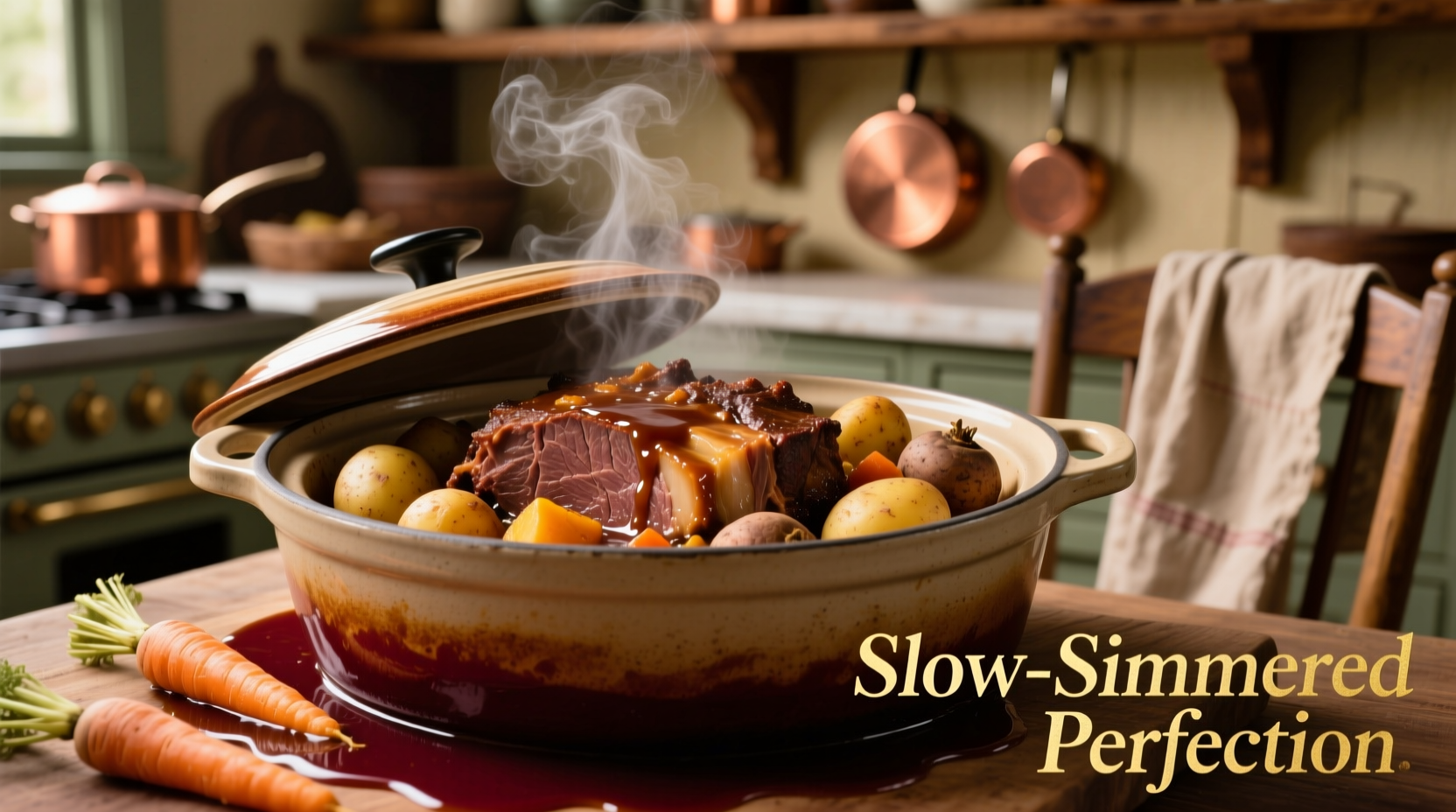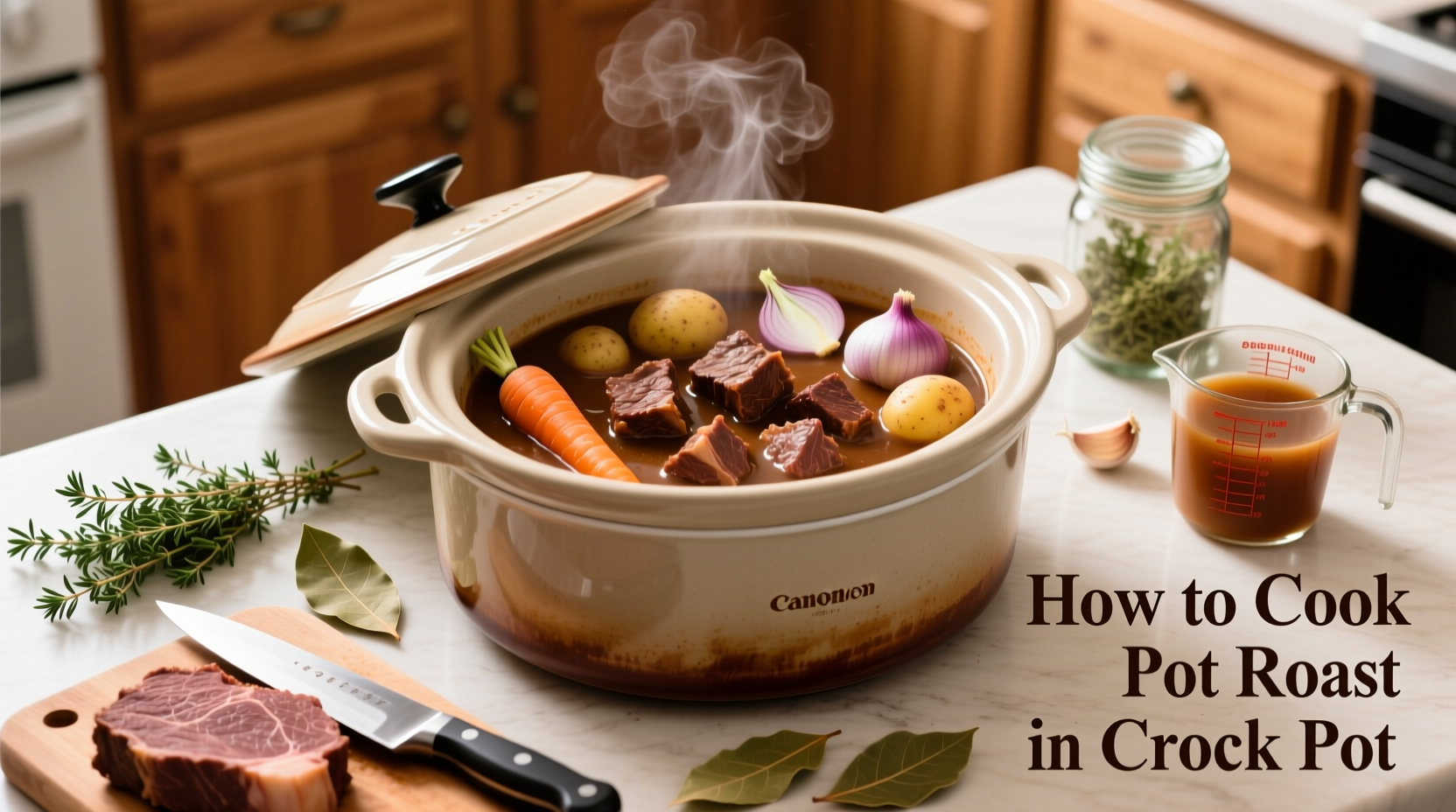For a perfect crock pot pot roast, sear a 3-4 lb chuck roast, layer with vegetables, add 1 cup broth, and cook on LOW for 8-10 hours until fork-tender. The internal temperature should reach 195-205°F for optimal tenderness.
Nothing beats the comforting aroma of a slow-cooked pot roast filling your home. This hands-off method transforms tough cuts into melt-in-your-mouth perfection with minimal effort. Whether you're meal prepping for the week or hosting a Sunday dinner, your crock pot delivers consistent results every time.
Why Crock Pot Pot Roast Wins Every Time
Slow cooking breaks down collagen in tougher cuts like chuck roast through low, steady heat. Unlike oven roasting which requires constant monitoring, the crock pot's gentle heat ensures even cooking without drying out your meat. The American Meat Science Association confirms that slow cooking at temperatures between 170-280°F for extended periods produces superior tenderness in connective tissue-rich cuts compared to high-heat methods.
| Cut of Beef | Best For | Recommended Cooking Time |
|---|---|---|
| Chuck Roast | Ideal marbling for slow cooking | 8-10 hours on LOW |
| Brisket | Rich flavor, requires longer cooking | 10-12 hours on LOW |
| Rump Roast | Leaner option, less fat | 7-9 hours on LOW |
Essential Ingredients for Flavorful Results
Gather these simple ingredients before you begin. Quality matters here—choose fresh vegetables and a well-marbled chuck roast for best results.
- 3-4 lb beef chuck roast (look for good marbling)
- 2 tbsp olive oil for searing
- 1 large yellow onion, chopped
- 4 carrots, cut into 2-inch pieces
- 3 celery stalks, cut into 2-inch pieces
- 4 garlic cloves, minced
- 1 cup beef broth (low sodium preferred)
- 2 tbsp tomato paste
- 1 tbsp Worcestershire sauce
- 1 tsp dried thyme
- 2 bay leaves
- Salt and freshly ground black pepper to taste

Step-by-Step Cooking Process
Preparation: 15 Minutes
- Pat the roast dry with paper towels—this crucial step ensures proper searing
- Season generously with salt and pepper on all sides
- Sear the meat in hot olive oil for 3-4 minutes per side until deeply browned
- Layer vegetables in crock pot bottom: onions, carrots, celery
- Add aromatics: garlic, tomato paste, Worcestershire sauce
Cooking: 8-10 Hours on LOW
- Place seared roast on top of vegetables
- Pour broth around (not over) the meat to maintain crust
- Add herbs: thyme and bay leaves
- Cook uncovered for first 30 minutes, then cover and cook on LOW
- Check temperature at 8 hours—aim for 195-205°F for fork-tender results
Avoiding Common Crock Pot Mistakes
Even experienced cooks make these preventable errors. The USDA Food Safety and Inspection Service warns that improper slow cooking can create food safety risks if temperatures remain in the danger zone (40-140°F) for too long.
- Don't skip searing—this Maillard reaction creates complex flavors you can't get from raw meat
- Never fill beyond ⅔ capacity—slow cookers need space for proper heat circulation
- Resist lifting the lid—each peek adds 15-20 minutes to cooking time
- Don't overcrowd vegetables—they should fit snugly but not packed tightly
- Never cook frozen meat—thaw completely first to avoid dangerous temperature zones
Serving and Storage Tips
Rest your roast for 15-20 minutes before slicing to retain juices. For the most tender results, shred rather than slice against the grain. Leftovers transform beautifully into next-day meals:
- Storage: Keep in airtight container for up to 4 days in refrigerator
- Freezing: Portion with broth for up to 3 months; thaw overnight before reheating
- Reheating: Warm gently in sauce to maintain moisture
- Next-day magic: Use leftovers for pot roast sandwiches, beef and barley soup, or hash
When to Choose HIGH vs. LOW Setting
Understanding your crock pot's temperature settings prevents overcooking or undercooking. According to FDA slow cooking guidelines, the LOW setting (around 200°F) is always preferable for pot roast as it maintains a safe temperature while breaking down connective tissues gradually. The HIGH setting (around 300°F) works for some dishes but can make pot roast tough by cooking the exterior too quickly before interior collagen breaks down.
Frequently Asked Questions
Can I cook pot roast without searing first?
Yes, but you'll miss out on complex flavor development. Searing creates the Maillard reaction that builds rich, savory notes impossible to achieve with raw meat. For best results, always sear before slow cooking.
Why is my pot roast still tough after 8 hours?
This usually happens when cooking temperature is too low or the cut lacks sufficient connective tissue. Ensure your crock pot maintains at least 185°F and use chuck roast (not sirloin or round). Continue cooking in 30-minute increments until fork-tender—some roasts need up to 12 hours.
How do I thicken pot roast gravy?
Mix 2 tbsp cornstarch with ¼ cup cold water. Remove roast and vegetables, then pour cooking liquid into a saucepan. Bring to simmer and gradually whisk in slurry. Cook 2-3 minutes until thickened. For richer flavor, reduce liquid by simmering uncovered for 15-20 minutes.
Can I add potatoes to my pot roast?
Yes, but add them during the last 2-3 hours of cooking. Potatoes added too early will disintegrate. Yukon Gold or red potatoes hold their shape better than russets. Cut into 1.5-inch chunks for even cooking.
Is 4 hours on HIGH the same as 8 hours on LOW?
No—these settings create different cooking environments. HIGH reaches target temperature faster but can overcook exterior before interior tenderizes. For pot roast, LOW setting produces superior texture. The 2:1 time ratio works for some dishes but not tough meat cuts requiring gradual collagen breakdown.











 浙公网安备
33010002000092号
浙公网安备
33010002000092号 浙B2-20120091-4
浙B2-20120091-4